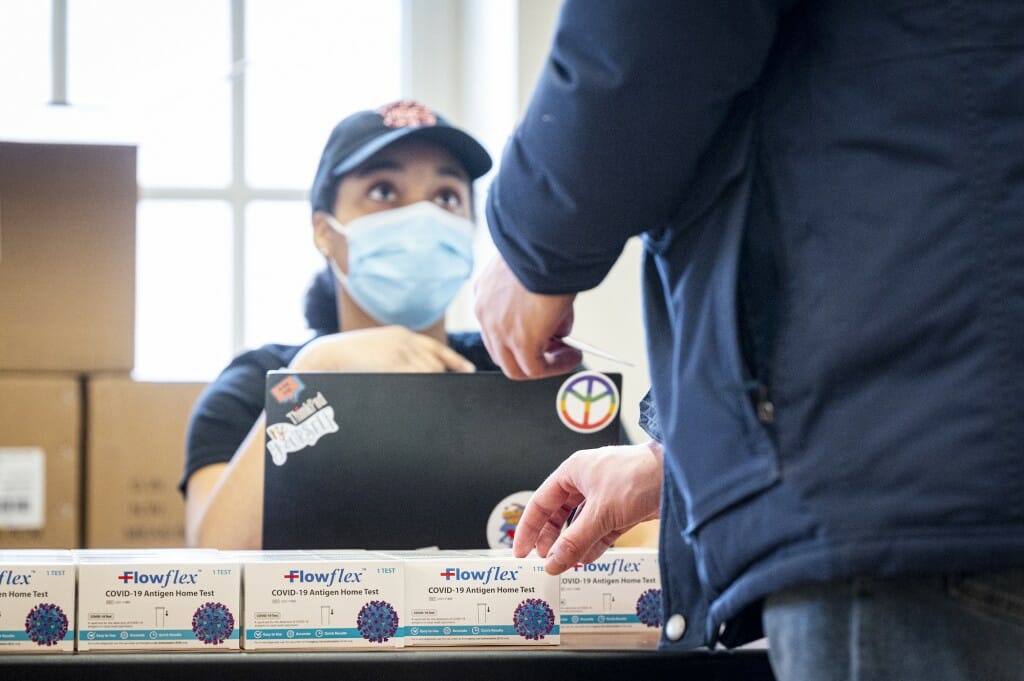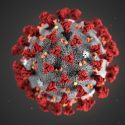COVID questions: You tested positive. What’s next? And, advice on boosters

Cheyanne King, a student worker at the Memorial Union, helps distribute COVID-19 at-home antigen testing kits on Jan. 18. Photo: Bryce Richter
This ongoing series answers questions about COVID-19 and the pandemic. If you have a question to submit, please email it to covid19update@uc.wisc.edu. See answers to previous COVID questions, and visit our COVID-19 impact site.
I tested positive for COVID-19. What next?
A positive COVID test means that you have COVID-19 and need to begin isolation procedures.
When am I safe to go out again?
For all people in isolation:
- You cannot travel for 10 days after your test.
- You must wear a well-fitting mask (surgical mask or N-95 recommended) for 10 days after your positive test, including outside your home and around other people inside your home.
- You should avoid anyone that is high risk (eg. pregnant women, elderly etc).
If you have symptoms, you must stay home for 5 full days after you are fever-free for 24 hours (without medication).
If you never developed symptoms, you must stay home for 5 full days after your test (the day of the test is day 0).
All of this is regardless of vaccination status.
How long do I wait to take another test?
You do not need to take another test. Use the CDC guidance for your isolation procedure rather than retesting. Tests could still come back positive after the 5 days of isolation have passed and symptoms have resolved. This viral shedding is why you need to keep wearing your mask for the full 10 days after your positive test.
Are there any over-the-counter meds that I can take to help speed this along?
Nothing will speed up your isolation period.
Over the counter medicines can make you more comfortable by easing some symptoms. You can take Tylenol or NSAIDs for fever and aches. Please make sure to read the labels for appropriate dosing. (DayQuil/NyQuil has Tylenol in it, so if you take this, do not take additional Tylenol. You can take Advil/Motrin/Aleve with DayQuil/NyQuil products.)
Are there things I should not do, such as exercise or drink caffeine, etc.?
There are no activities that need to be avoided with this illness. If you have symptoms, be sure to rest and practice supportive care. If you have any trouble breathing or have a very high fever (over 102 degrees Fahrenheit), please call your doctor or seek medical care.
—Devlin Cole, preventive medicine resident, UW–Madison Department of Population Health Sciences
There is a study from the UK stating the efficacy of the Pfizer booster wanes significantly by 10 weeks — down to only 45%, whereas Moderna’s booster remained very effective after 10 weeks. Is one kind of booster shot better than others?
It is now clear that the immunity developed after all available COVID-19 vaccines starts to decrease over time after completing the primary series. This is especially true for the immunity needed to protect against omicron variants. For this reason, the CDC recommends that everyone over 12 years of age receive a booster dose. This should occur after 2 months for J&J vaccine recipients, and after 5 months for Moderna and Pfizer recipients. In all circumstances, an mRNA vaccine (either Moderna or Pfizer) is preferred for the booster vaccine.
In addition, the CDC has clarified the terminology, so that now, to be considered ‘up to date’ with COVID-19 protection, everyone eligible should be fully vaccinated with a primary series and receive a booster as soon as eligible.
—James Conway, Pediatric Infectious Diseases Fellowship Program Director and School of Medicine and Public Health Office of Global Health Director
Are booster shots still worth it if they don’t last very long and people who get booster shots are still getting infected?
Yes. Getting a booster shot helps to prevent serious illness. If you have been boosted and you get sick with COVID-19, your symptoms are more likely to be mild and you are less likely to be hospitalized. Booster shots are an important part of omicron being labeled a “milder variant.”
While breakthrough infections do still happen among people who have received a booster, the rate (or incidence) of infection is lower if you’ve been boosted.
—Devlin Cole, preventive medicine resident, UW–Madison Department of Population Health Sciences
Tags: COVID questions, covid-19, health


